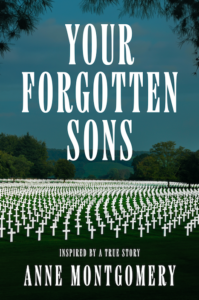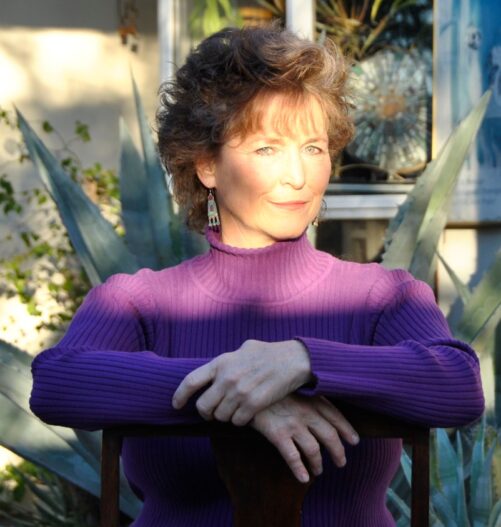Anne Butler Montgomery has worked as a television sportscaster, newspaper and magazine writer, teacher, author, and amateur sports official. She finished her on-camera broadcasting career with a two-year stint as the studio host for the NBA’s Phoenix Suns. Montgomery was a freelance and/or staff reporter for six publications, writing sports, features, movie reviews, and archeological pieces. Her novels include Your Forgotten Sons, The Castle, A Light in the Desert, Wild Horses on the Salt, The Scent of Rain, and Wolf Catcher. Anne is a foster mom to three sons and a daughter. When she can, she indulges in her passions: rock collecting, scuba diving, theater, and playing her guitar. Meet Anne:
You are an author, but is it your day job? If not, what does fill your days? I am now retired from all my “day” jobs. I was a television sportscaster at both the local and national levels, a print reporter, and a teacher. I spent four decades as a sports official, where I called amateur football, baseball, ice hockey, soccer, and basketball games to varying degrees. I also served as a high school football referee and crew chief for 24 years. Today, I mostly write books, but I travel when I can into the wilds of Arizona on rock-collecting trips. I also play my guitar and periodically jump into the sea. I’m a scuba diver.
Did you always want to be an author? Not at all. In fact, I rarely read as a child, and learned in my 40s that I’m dyslexic, so the fact that I’m an author still sometimes comes as a surprise. Prior to being an author, I had numerous careers. I spent 10 years as a television sports reporter and anchor, where I wrote dozens of stories every day. When I was no longer considered pretty enough to be in front of a camera, I moved into print journalism, where I was tasked with writing more in-depth stories. So, the move to novels didn’t seem that strange. It was just a longer form of storytelling.
What is your most recent book and what inspired you to write it? The idea for my World War II historical fiction novel Your Forgotten Sons came to me in an unexpected way. I’d traveled to Baltimore at the request of a dear friend. She was facing a delicate, possibly life-changing surgery at Johns Hopkins Hospital and asked that I  stand in as her healthcare power of attorney. The night before the operation, Gina, handed me a Ziplock bag. Inside I found a packet of yellowed letters. We’d spoken of Gina’s elusive Uncle Bud—her mother’s handsome, rakish brother—a man who served in the Graves Registration Service during World War II. “No matter what happens to me, I want you to tell Bud’s story,” she said. And so, I did.
stand in as her healthcare power of attorney. The night before the operation, Gina, handed me a Ziplock bag. Inside I found a packet of yellowed letters. We’d spoken of Gina’s elusive Uncle Bud—her mother’s handsome, rakish brother—a man who served in the Graves Registration Service during World War II. “No matter what happens to me, I want you to tell Bud’s story,” she said. And so, I did.
How do you hope your book uplifts those who read it? It is my hope that readers will come to respect those who performed perhaps the most difficult job in the military. The soldiers who served in the Graves Registration Service had a miserable job: locate, identify, and bury the dead. They are rarely mentioned in books or films, where the focus is often on the act of killing, not the aftermath of the carnage. It is also my hope that by telling Bud’s story I can raise awareness about mental health issues in the military. Today mental health problems in the general public are no longer hidden away, still military men and women often struggle in silence, afraid that coming forward will hinder their careers. War is awful and damaging both physically and mentally. The military must be open to treating both types of injuries.
What are you most excited about with this book? I have always been interested in history, especially the period associated with World War II, but I had never written a book about that time. When I was in college, I studied the war in depth while living in Luxembourg during a semester abroad, one of the most memorable times of my life. So, when Gina placed those letters in my hand, it was almost as if I was meant to tell Bud’s story.
How did writing a book help your career take off? I’d like to say my writing career took off like a rocket, but that wouldn’t be true. It’s been a slow climb. If you pardon the baseball analogy, most authors— who aren’t already famous in some other way—begin in the minor leagues, with self-publishing or tiny, independent publishers, which compares to A ball. If they stick with it, they might move up to AA and then AAA, where, like baseball players, they will make more money and have more fans. Few of us will ever make it to the majors: the Big Five. So this is a classic example of just do your best and enjoy the ride.
What advice would you give to someone wanting to succeed in your professional industry? Never quit your day job! Writing today is a tough way to make a living. Depending on who you ask, there are between 500,000 to 1 million new books coming out every year. If you count all the self-published books, that number rises to about four million annually. Now consider all of the previously published books dumped on that mountain. That said, I would never tell anyone not to become an author. I just want them to be realistic. Also, if you want to succeed, you have to graciously accept criticism and learn from it. If no one wants your first book, write another one. Then another. It’s like learning a sport. The more you play, the better you get. And, like it or not, you must have a robust social-media presence. You need a website and a blog. You need to regularly share posts and do podcasts. You can write the most brilliant manuscript, but if publishers can’t find you on the internet, your baby will be dumped in the nearest digital trash can. In the end, write for the joy of it. If you’re lucky enough to make a good living as an author, great! Just don’t go into the field expecting that to happen.
How do you handle setbacks and criticism? Before becoming an author, I spent 40 years as an amateur sports official where I called football, baseball, ice hockey, soccer, and basketball games to varying degrees. I’ve been screamed at, had my tires knifed, and required a police to escort to my car. I was also a sports reporter during a time when women rarely did that kind of thing. When I made mistakes, I was sometimes ridiculed in public. Under the circumstances, it’s pretty hard to hurt my feelings. In the meantime, I learned from those situations, just as I’ve learned from those who have criticized my writing. I highly recommend that authors thank those who take the time to offer constructive criticism. In the end, their words are much more valuable than those who praise us.
Being an author today is like running a business. How do you manage all your publicity, social media and keep your engagement up with readers? I am fortunate that I no longer have to work full-time. Before retiring from teaching, I mostly wrote over my summer vacation. Today, I am free to write year-round and have much more time to deal with social media, blogging, appearing on podcasts, and managing my website, obligations that get easier when they’re done on a regular basis. I think my previous job as a journalist prepared me well for my current role as an author, a career where I was required to write, do interviews, attend myriad events, and present stories on camera all on deadline. I think it’s all about discipline.
How do you hold yourself accountable and achieve the goals that you set forth? I believe my former job as a journalist set the stage for my responsibilities as an author. In reporting, things happen fast. One has to be prepared to switch gears quickly. A perfectly planned broadcast can be changed in an instant by breaking news. An artfully written story can be shelved, and another needed to take its place in a short period of time. Being a reporter taught me to get assignments done immediately, because you never know what might come up in the next minute, hour, or day. Though I don’t travel to work, when I enter my home office I consider myself a business owner. I respond promptly to all emails, address my social media responsibilities, and am five minutes early for calls and meetings. I consider myself a professional and do my best to act accordingly.
How do you structure your day and make time for writing? I do all my emails responses and social media first thing in the morning, though I write my weekly blog articles whenever the inspiration strikes me. I generally work on book writing and on-line research the rest of the morning. I do in-person interviews and/or location scouting when it works for everyone involved.
What do you find most fulfilling in the career that you’ve chosen? Writing for me is a joy. When I’m having a bad day, I can immerse myself in an article or book chapter and forget about the world around me. I find the whole process therapeutic and not like work at all.
What book uplifts you? Since I write in several genres, it varies. Most recently Kristin Hannah’s The Women—a story about female nurses who served heroically in Vietnam—struck a chord. Like my new novel Your Forgotten Sons, it details the horrors of war, how the participants struggle to understand what’s going on around them, and how some of them ultimately survive.
Anything else you’d like to share with your readers? I would like readers to consider reading genres outside their comfort zones. My novels include historical fiction, suspense thriller, young adult fiction, and women’s fiction, so yes, I’m biased in this regard. Still, I think we all have a lot to learn when we branch out and explore new genres.
Meet Anne and learn more about all her books via her website.


Thank you for inviting me to join you on Books Uplift! 😉
You’re most welcome. I’m thrilled to spotlight you and your book!